Beware of PBNs – Private Blog Networks for SEO?
Aug 09, 2023
Written by Andrew Sperl

As Vice President and a Partner at Vazoola, Andrew has his hands in all aspects of the business from sales to marketing to employee development and much more. He has passion for all aspects of building and growing a business, and has devoted himself to becoming an expert on off-page SEO.
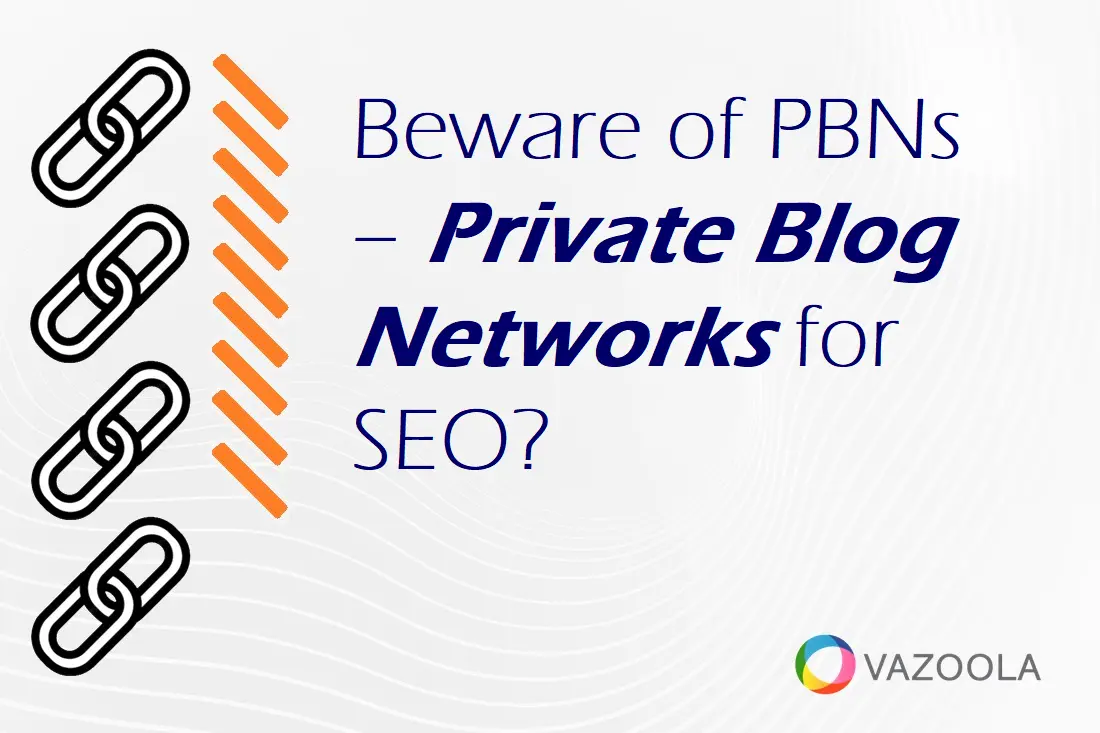
Building links is one of the most challenging aspects of a website's SEO. Over time, so many marketers, in their quest to ease this process, have stumbled upon shortcuts. One method that has gained notoriety is the Private Blog Network or PBN.
Today, the classification of a PBN hovers between black hat SEO, gray tactics, and even white-hat strategies, depending on its quality. But, the underlying fact remains that these networks breach Google's guidelines.
Here at Vazoola, we aim to debunk some myths and reveal the reasons behind our stance on this controversial link-building strategy.
Take a look at this table that gives a quick view of the pros and cons when considering using private blog networks:
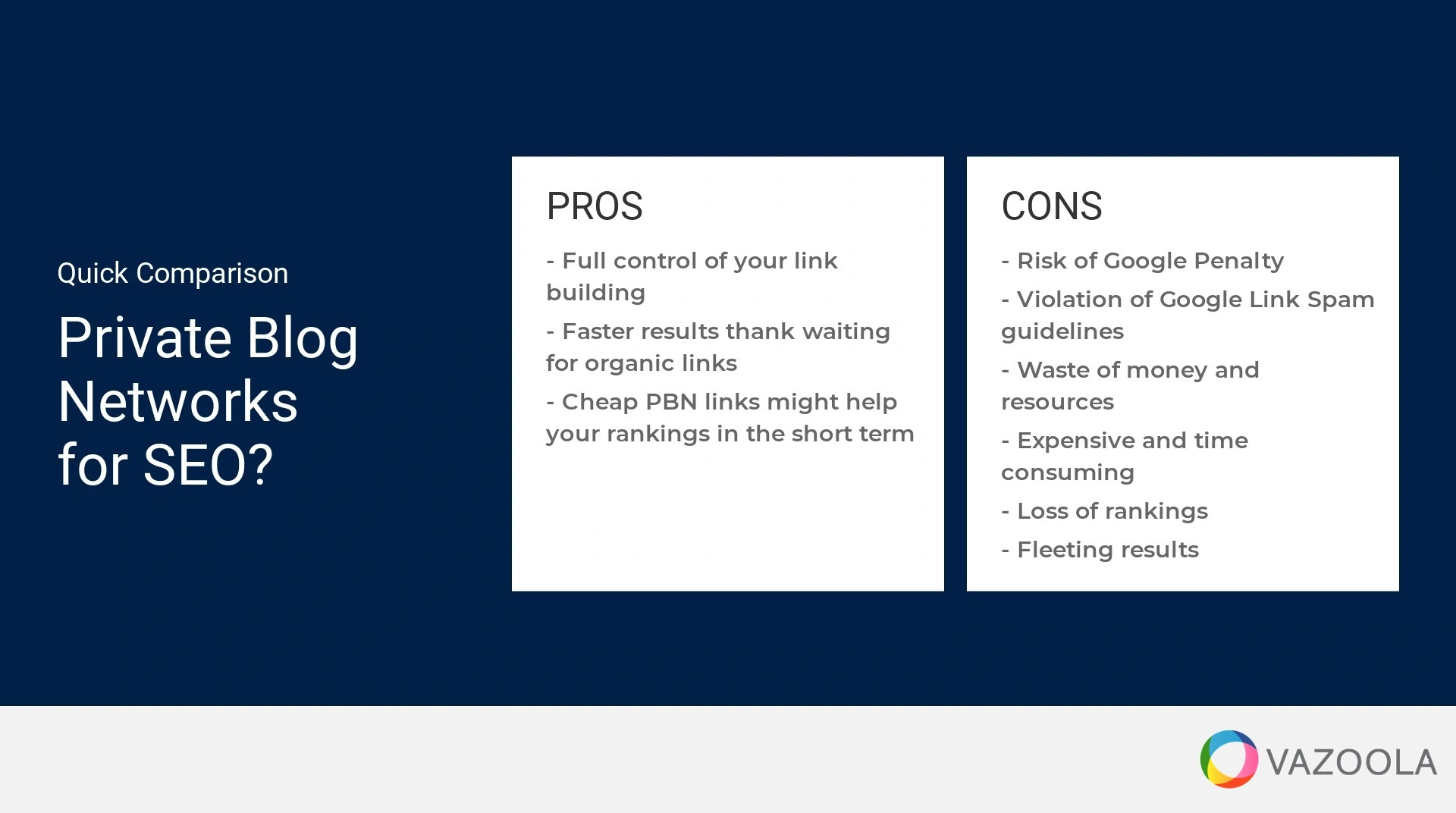
Key Takeaways:
-
A PBN is a collection of websites used to artificially boost the search rankings of a main website by leveraging the authority of expired domains.
-
While a PBN can offer quick ranking improvements, it also carries significant risks, including Google penalties, loss of credibility, wasted investment, short-lived results, and a dependency on a potentially outdated strategy.
-
A PBN can give a temporary boost in SEO due to the authority of used domains. Yet, this is often short-lived, and search engines are becoming better at detecting and penalizing these strategies.
-
PBN domains often show patterns and inconsistencies like identical hosting, lack of organic traffic, spun/duplicate content, similar designs, poor internal linking, and unnatural backlink profiles.
-
The process of building private blog networks includes acquiring domains, securing diverse hosting, publishing high-quality content, strengthening with legitimate backlinks, and maintaining operational stealth.
Table of Contents:
What is a Private Blog Network PBN?
A Private Blog Network, commonly referred to as a PBN, is a collection of websites or blogs owned and operated by a single entity, with a primary objective of building links to a main "money" website rather than providing value to its readers.
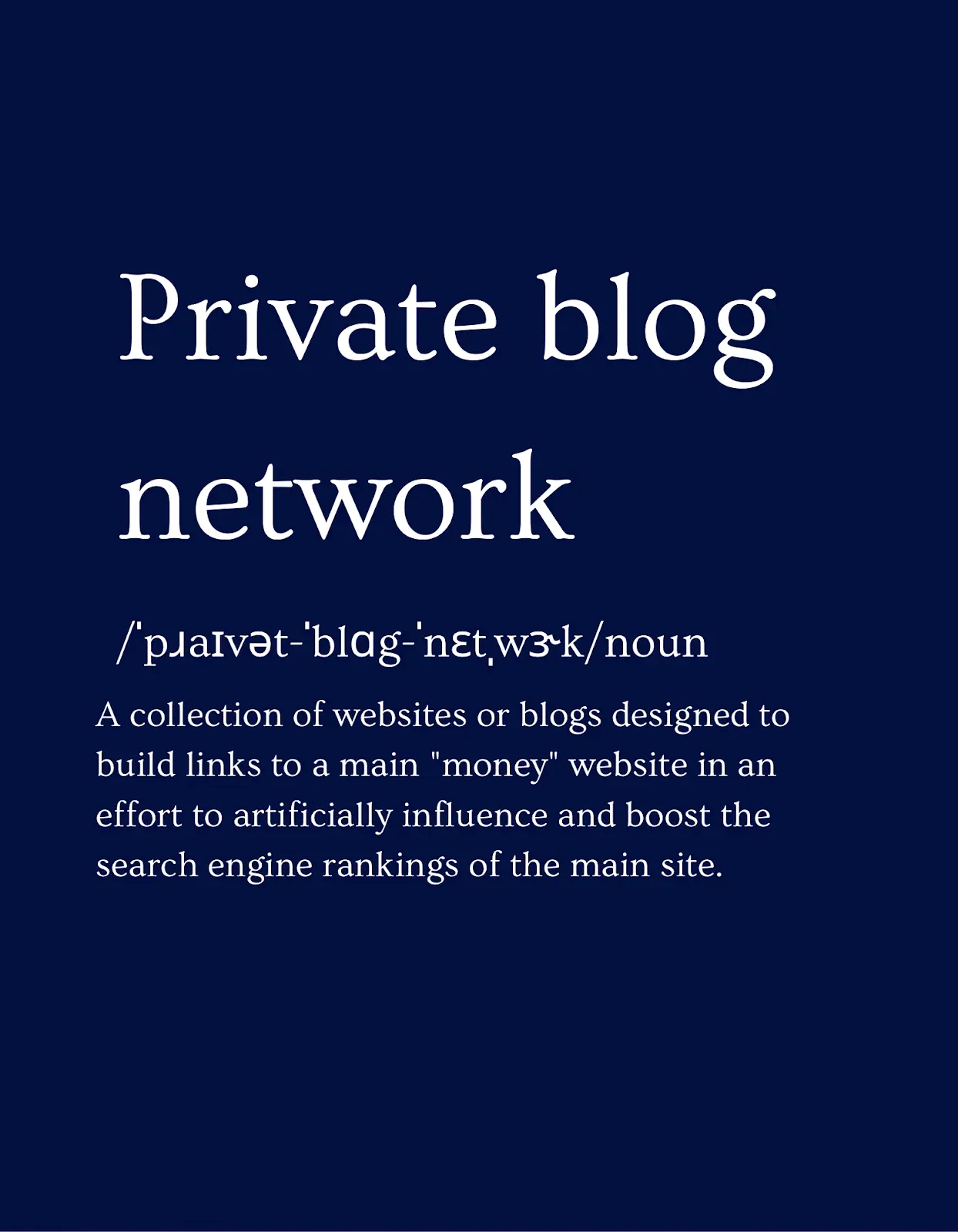
By doing so, the intention is to artificially influence and boost the search engine rankings of the main site. These networks typically utilize an expired domain with existing authority to ensure that the links have a strong impact.
What Are the Risks of PBNs as Link Building Strategies for SEO?
Incorporating private blog networks into your SEO strategy might seem like a fast-track to improved website rankings, but there's a lot at stake
We have seen a lot of clients who come to us after their website was negatively impacted by getting backlinks from a PBN, and it can be a lot of work to undo the damage. This has helped to shape our position on using private blog networks and how they re usually a gamble not worth taking. Let's delve into the risks:
-
Google Penalties: Google's algorithms, like Penguin, are designed to detect and penalize websites involved in manipulative link schemes, including PBNs. If caught, your own websites could face severe ranking drops or even de-indexing. Also, Googles Link Spam policies warn against low quality tactics that are often found when using PBNs.
-
Loss of Credibility: Relying on a PBN might not just affect your website's ranking. If your audience or other sites in your niche find out about your PBN usage, it can damage your reputation, making partnerships or collaborations difficult.
-
Wasted Investment in Low-Quality Networks: Not every PBN is created equally. Investing in low-quality networks might not only be ineffective but could actually harm your website's rankings.
-
Short-lived Results: The boost in rankings might be temporary, but the penalty or damage could be long-term. Once Google detects the scheme, any short-term gains will likely be wiped out.
-
Dependency on a Volatile Strategy: When you're dependent on a PBN, your success is tied to their effectiveness. As search algorithms evolve, private blog networks can become obsolete, putting your rankings within search results at risk.
What Are the Benefits of PBNs as Link Building Strategies for New Websites?
While we advise caution, it's also essential to understand why some marketers are still drawn to private blog networks.
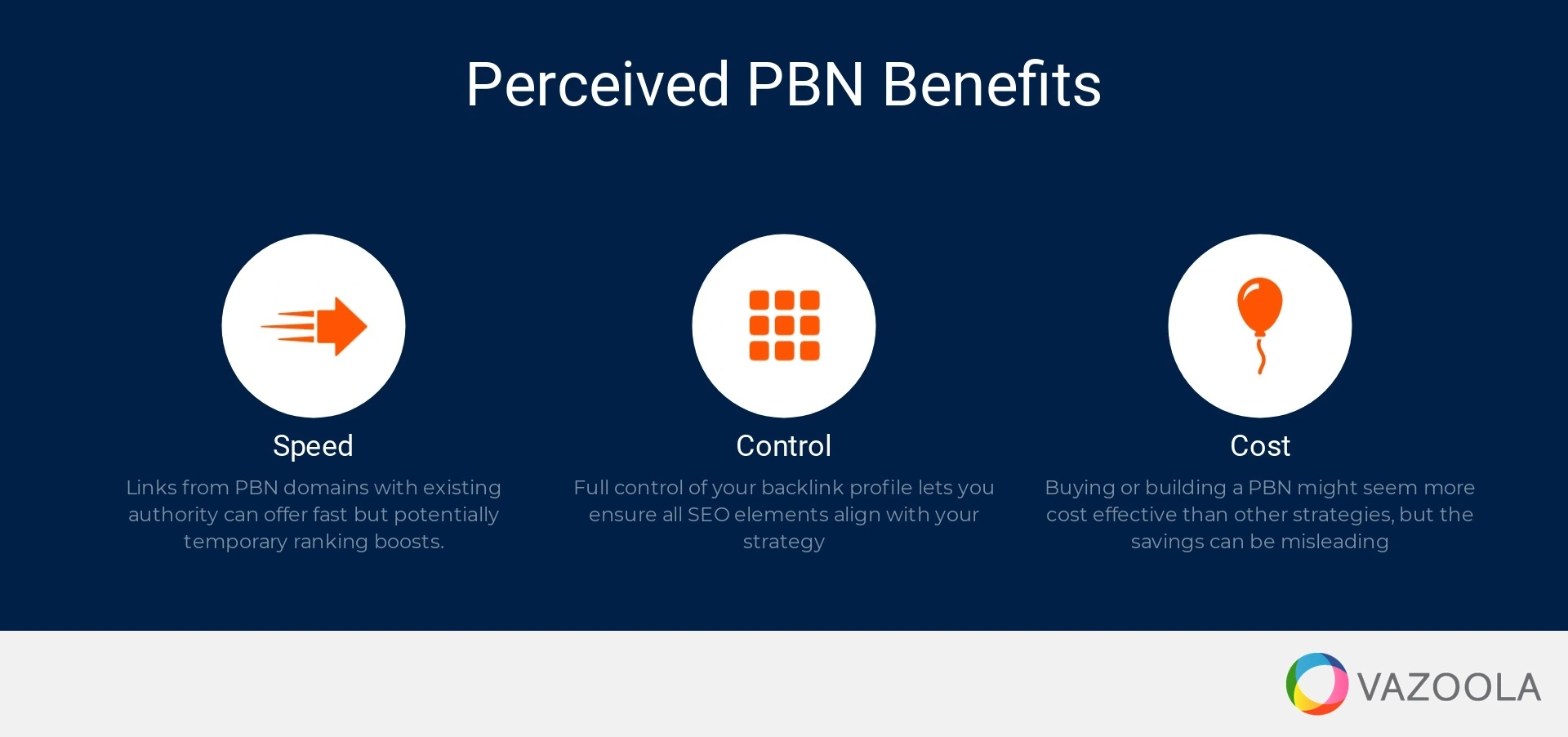
Despite the potential pitfalls, there are some perceived benefits:
-
Full Control Over Backlink Profile: One of the main attractions of a PBN is the unparalleled control it offers. You can dictate the anchor text, content ideas surrounding the link, and the frequency of the links, ensuring they align perfectly with your strategy.
-
Rapid Ranking Improvement: Given that the domains in a private blog network often have existing authority, the links provided can offer a swift improvement in rankings. However, this is often a temporary surge, and there's always the looming risk of a penalty.
-
Cost-Effective (Sometimes): For some, building or buying access to a PBN might seem cost-effective compared to other strategies for acquiring links, especially if immediate results are seen. But it's crucial to weigh these short-term gains against potential long-term losses.

How Do PBN Links Impact SEO?
As all SEO professionals know, links play a pivotal role in determining the authority and relevance of a website.
Private blog network links can, without a doubt, provide a temporary boost in SEO due to the established authority of the expired domains they often use. This is the allure: seemingly instant results without the prolonged wait of organically building links.
However, it's akin to a sugar rush; it feels good momentarily, but the crash is inevitable. While the short-term gains might be enticing, the longer-term risks are daunting.
Search engines, and particularly Google, have become increasingly adept at identifying and penalizing unnatural linking patterns, of which private blog networks are a prime example. It's a lot harder to scheme for a better ranking with private blog networks once the algorithms at Google understand it.
Here at Vazoola, we have learned through extensive experience and industry trends that these artificial boosts are simply not worth the long-term risks, making PBNs an SEO strategy we don't endorse.
How To Avoid #BlackHatSEO:
— SEO Tools & Tips (@SEOToolsTips1) October 19, 2021
Avoid setting up a private blog network for the purpose of getting links. Differentiate your website and content so people link to you naturally rather than fake it till you make it. That never ends well.
Are PBNs a Bad Link Strategy in SEO?
The SEO industry is nuanced, and it can be challenging to paint with a broad brush. However, when it comes to whether or not PBN backlinks are bad, we'd assertively lean towards “yes” for a majority of them.
The fundamental reason we advise against seeking PBN backlinks is integrity. PBN backlinks aren't built on genuine merit or value; they're built to manipulate rankings artificially.
Given the volatility and the stiff penalties associated with private blog networks, the risks far outweigh the rewards.
We have very rarely seen a PBN executed at a high level. This would require each individual site to provide real value to visitors, rank well for keywords, attract real traffic and visitors, and continuously gain new backlinks.
This would require a huge amount of time and resources which is why we don't see it often.
Instead, we've seen firsthand the fallout from relying on low quality private blog networks, with websites facing sharp drops in rankings or - worst-case scenario - getting removed from search results entirely.
While there might be rare exceptions of high-quality PBNs that operate under the radar, the vast majority are ticking time bombs in an SEO strategy. PBNs all too often feature unnatural links that easily can result in a Google penalty. Here's Marie Haynes with the right way to check if your website has a Google Penalty.
Our experience at Vazoola has shown that genuine, organic link-building strategies always prevail in the long run, fostering credibility and sustainable growth.

Does Google Penalize PBN links?
Google has a clear stance against manipulative link-building tactics, and private blog networks squarely fit that bill.
Google's guidelines explicitly warn against selling links, buying links and "link schemes," which are any attempts to artificially inflate a site's ranking through deceptive or manipulative links.

Private blog networks, by their very nature, are designed to manipulate search rankings by providing a quick influx of backlinks from a network of other websites.
When Google's algorithm detects these patterns, penalties can ensue.
Penalties can range from a simple ranking drop for specific pages to a more severe site-wide manual penalty, which could result in the site being de-indexed altogether.
Penguin Algorithm's Influence on PBNs
The Penguin algorithm demonstrates Google's commitment to fostering a fair and organic digital landscape.
Launched in April 2012, the Google update known as Penguin was specifically designed to target websites that violate Google's Webmaster Guidelines, with a keen focus on nefarious link-building practices.
Penguin aimed to identify and penalize websites that used manipulative tactics to gain backlinks, such as purchasing links or accessing them through link farms or private blog networks.
Over the years, the algorithm has seen several updates, each refining its capability to detect and combat artificial SEO strategies.
As of its last major update in 2016, Penguin now operates in real-time within Google's core algorithm. This means it continuously checks on link quality and can apply or lift penalties without waiting for the next algorithm update.
Given Penguin's ever-watchful eye, it's a gamble to rely on private blog networks, as the risk of getting caught and penalized remains persistently high.
Should You Buy PBN Links?
Marketers and their site owner counterparts often reach a crossroads in their SEO journeys. The question is whether to buy or not to buy links through PBN websites.
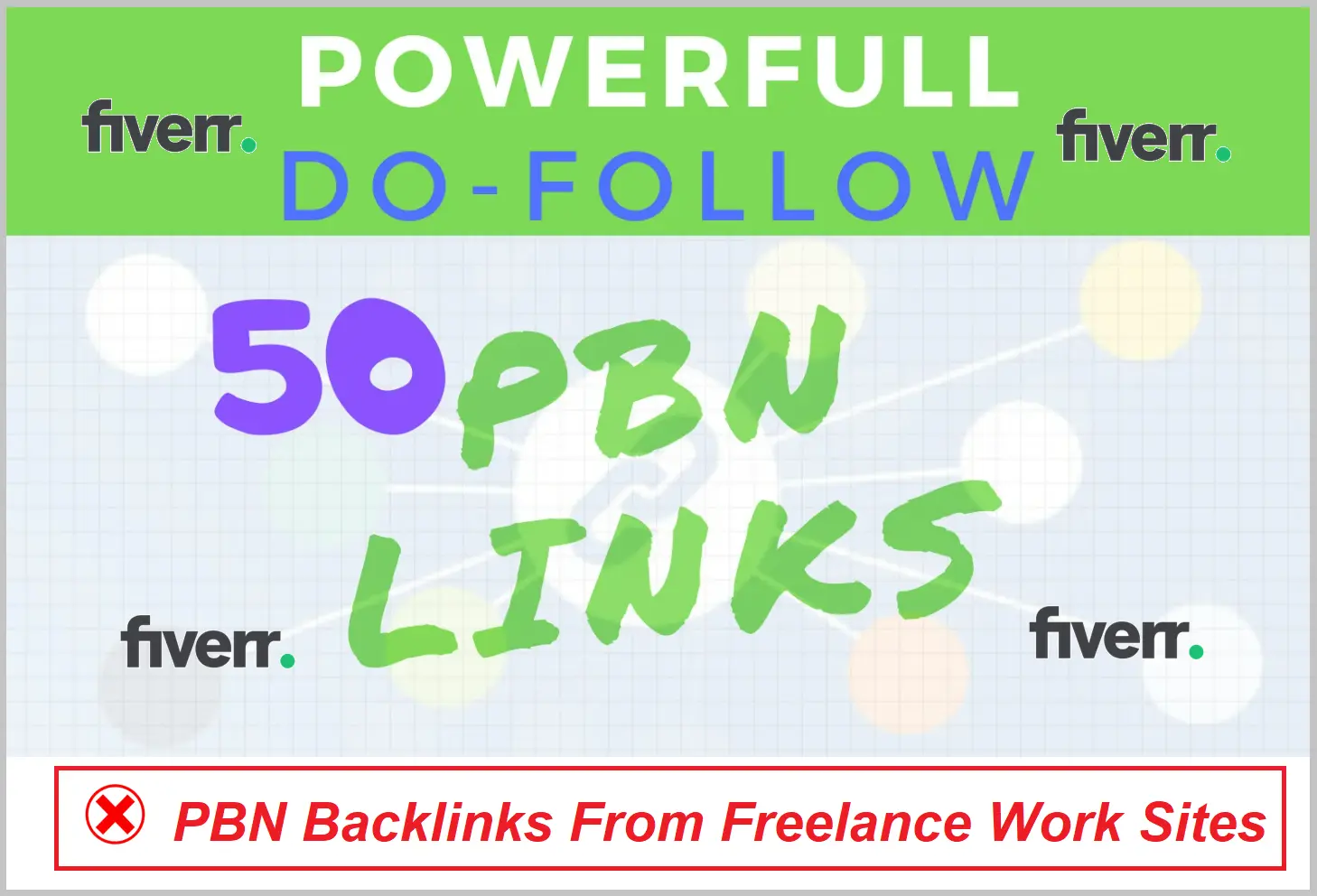
Our link building services don't include PBN strategies or backlinks from any PBN, and we don't suggest anyone else use them either. While the allure of potentially rapid results might be tempting, the costs far outweigh the benefits.
Beware of cheap gig websites that sell links. These often are low-quality PBNs rather than legitimate real websites. We’ve seen many spammers peddling links from a PBN in our inbox. Always vet opportunities before jumping in.
Engaging with a PBN that sell links places your website in a precarious position, with the looming threat of penalties that can undo months, if not years, of hard work.
More than just rankings, it's your brand reputation that's at stake. The digital landscape is built on trust, and the use of manipulative tactics can tarnish the image and credibility of your brand.
We've seen instances where businesses face not only digital penalties but also a loss of faith from their audience.
At the end of the day, sustainable, organic growth stands as the gold standard in SEO, and cutting corners with a PBN just to earn more links and unnatural links is a risk we believe is not worth taking.

How do PBNs Work?
The essence of Private Blog Networks revolves around manipulating search algorithms, and their operation is a blend of strategy and subterfuge.
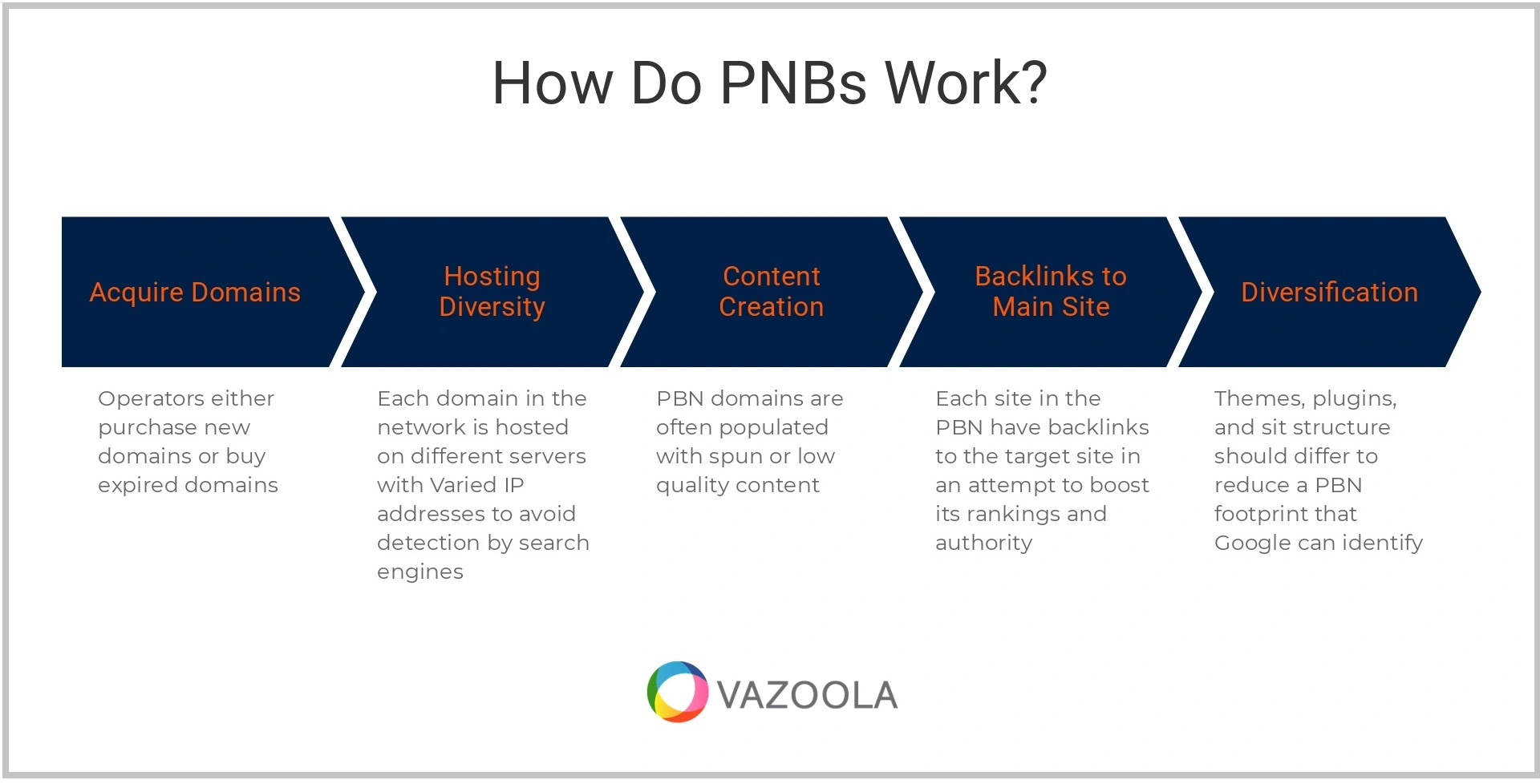
At its core, a PBN involves a collection of domains that are either newly registered or purchased post-expiration, all of which are set up to point links back to your primary website to boost its authority.
The process typically unfolds in a few stages, including:
1. Domain Acquisition
This is the first step, where operators either purchase domains for new websites, or, more commonly, buy expired domains. The allure of expired old domains lies in the pre-existing authority and backlinks they might possess, making them a more potent tool in the PBN arsenal.
2. Hosting Diversity
Each domain in the network is hosted on different servers with varied IP addresses. This is a deliberate move to ensure they appear unrelated and avoid detection by search engines.
3. Content Creation
To maintain the facade of authenticity, these domains are populated with content. However, instead of genuinely valuable content, many PBNs use spun articles or low-quality posts. The key is to make the website look genuine to pass search engine scrutiny.
4. Backlinking to the Main Site
The crux of a PBN's utility lies here. Each site in the network contains strategic links pointing to the main website, funneling authority and boosting its ranking. These backlinks are diverse in anchor text, and they naturally link to external websites.
5. Diversification
Operators ensure that themes, plugins, and structures of these sites differ, further enhancing the illusion of diversity and reducing the risk of detection.
While this process might sound methodical, it's crucial to remember that it's built on shaky ground. The very fabric of PBNs is woven to deceive search algorithms. And as these algorithms evolve, the chances of detection grow, rendering PBNs a high-risk strategy to build links.

Are Private Blog Networks PBNs Effective?
There's no one-size-fits-all answer for whether or not Private Blog Networks still work,
Some industry veterans might argue that well-executed, high-quality PBNs can still provide a temporary boost in rankings.
And in some isolated cases, this might hold some truth. However, this potential uptick comes with a caveat: the risks are amplified as search algorithms, especially those of major players like Google, become more sophisticated and adept at identifying such schemes.
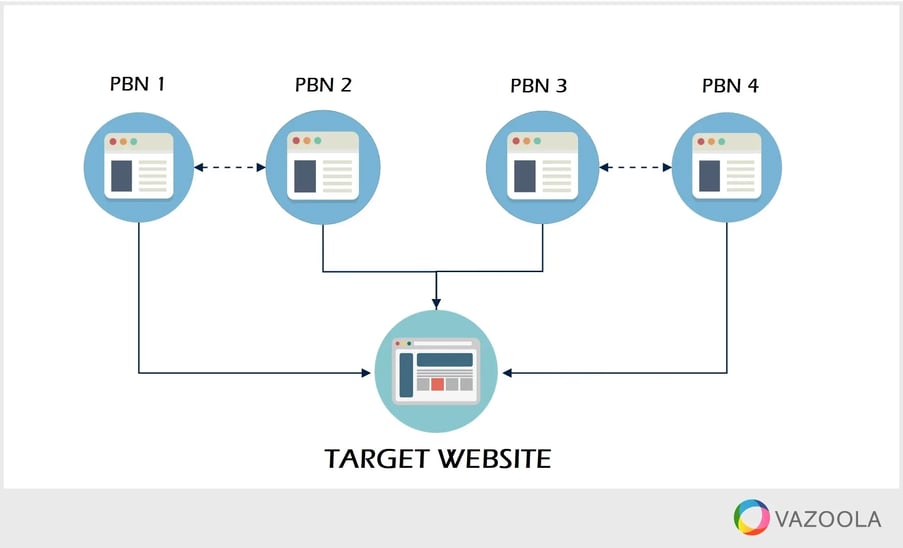
Moreover, while the allure of a "quality PBN" might sound enticing, it's essential to underline a critical point: Most PBNs out there don't meet this so-called high-quality criterion.
The vast majority are hastily set up, with poor content, transparent link patterns, and other footprints that make them easy prey for advanced search algorithms.
Thus, even if a temporary boost is achieved, the looming threat of penalties or de-indexing casts a long, ominous shadow over such short-lived gains.
Here at Vazoola, we've witnessed the pitfalls, and our experience has shown that the risks far outweigh the potential benefits.
In the long run, genuine, white-hat SEO strategies prove far more resilient and rewarding.
Are PBNs worth it?
The age-old adage "not everything that glitters is gold" rings particularly true when we discuss the viability of Private Blog Networks in modern SEO.
On the surface, the appeal of PBNs might be understandable. When executed with meticulous precision, using high-quality sites replete with exceptional content, PBNs can indeed yield results.
However, digging deeper reveals a different narrative. Here at Vazoola, our observations and experiences underscore the fact that the ROI on PBNs is often not favorable.
Consider the resources you pour into constructing a high-quality PBN: time, money, and link building efforts.
Establishing a network that remains undetected, maintains its authenticity, and continues to pass on link juice is no small feat. But even if you manage this, the potential rewards are overshadowed by the looming risks of penalties, de-indexation, and brand reputation damage.
Moreover, these resources could be redirected towards authentic, long-term SEO strategies that not only boost rankings but also bolster your brand's credibility.
In the grand scheme of things, chasing after the ephemeral gains of PBNs seems like a gamble, especially when the stakes include your brand's digital reputation.
So, while PBNs might offer a tantalizing promise of quick results, we've learned that the long-term dividends of genuine, white hat backlinks are incomparably more valuable.
Pro tip:
Before investing in PBNs, evaluate the long-term sustainability and potential penalties against short-term ranking gains, as the risk of algorithmic or manual penalties might outweigh the temporary benefits.

How to Identify Private Blog Networks
PBNs have evolved to be quite stealthy in the world of SEO, making it a challenge to pinpoint them immediately.
However, with a discerning eye and the right tools, detecting PBNs becomes feasible.
Many PBNs, especially those constructed in haste or on a tight budget, exhibit glaring patterns and inconsistencies.
Our team is experienced with spotting the hallmarks of PBNs and we're happy to pass these data points onto you so you can protect your site from low quality PBN links as well.
-
Single Owner: Often, PBNs give themselves away through traces like identical hosting providers or overlapping IP addresses. Operators might use the same hosting for multiple websites to save costs, but this leaves an easily traceable footprint. The WhoIs database for website contacts also can help identify identify individual website owners.
-
Lack of Organic Traffic: Genuine sites typically have a steady flow of organic traffic. In contrast, PBN websites might show little to no genuine visitor engagement or be riddled with spammy ads and unnatural link combinations, each red flags.
-
Spun or Duplicate Content: High-quality content is expensive and time-consuming to produce. PBNs, aiming for quantity over quality, often resort to 'spun' articles or duplicate content across their network.
-
Uniform Themes/Design: If you come across multiple sites with strikingly similar designs or cookie cutter themes, be wary.
-
Poor Internal Linking: . Additionally, genuine sites boast natural inbound links structure directing users to internal pages, while PBNs might neglect this, focusing only on external links.
-
Unnatural Backlink Profiles: Private blog network owners often use shady SEO tactics to boost their domain authorities. Its also typical to see very similar backlink profiles among the individual sites within a PBN, with each site linking to all the other sites in the PBN.
Being able to spot a PBN can shield your site from unintentionally associating with them, safeguarding your site's reputation and standing in the eyes of search algorithms. Try our backlink checker tool or one listed below!
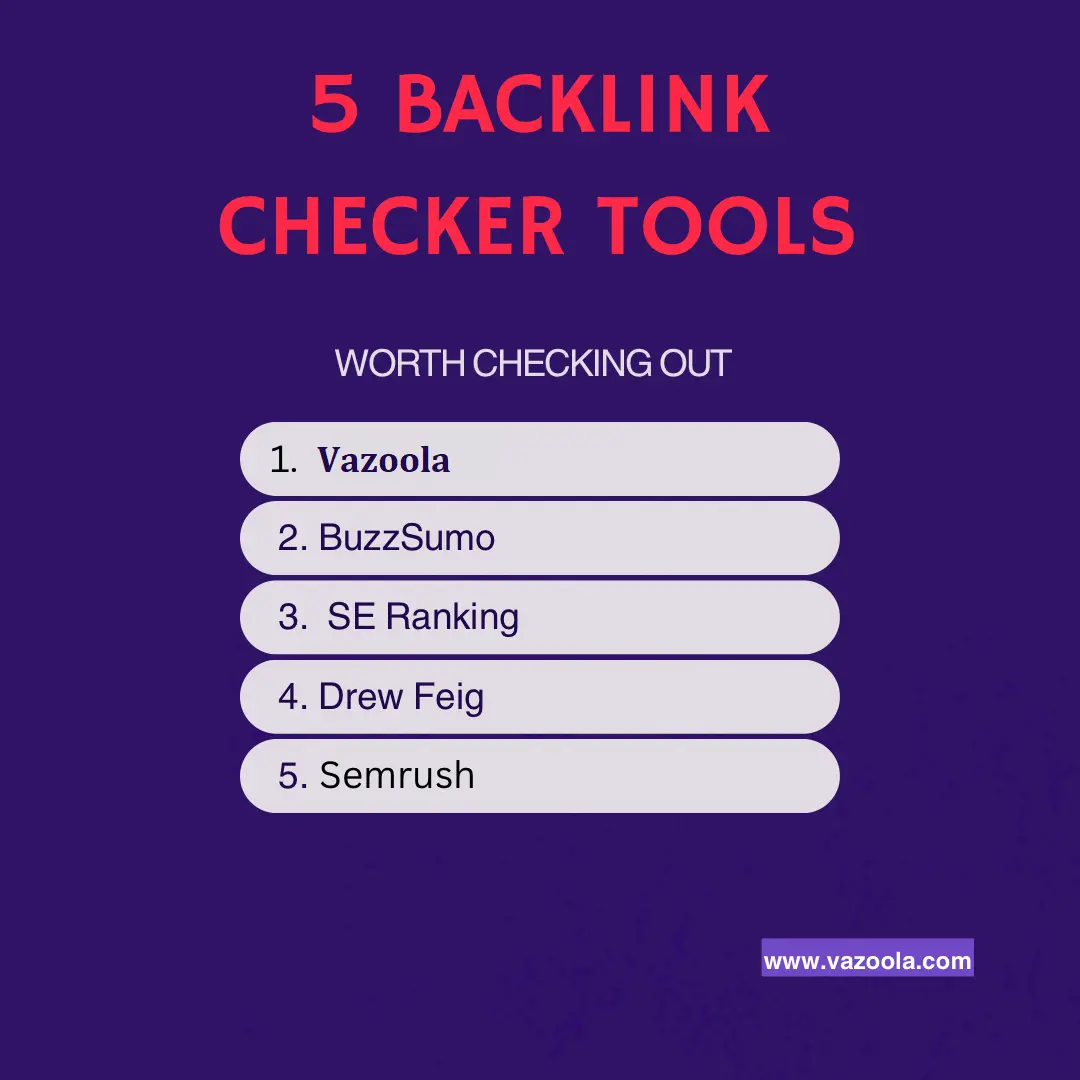
Fortunately, strategies are available to assist. If you’re concerned about identifying PBNs, you might:
-
Use Backlink Audit Tools: Harness the power of technology. Backlink audit tools can sift through your link profile, highlighting potentially harmful backlinks that could be from PBNs.
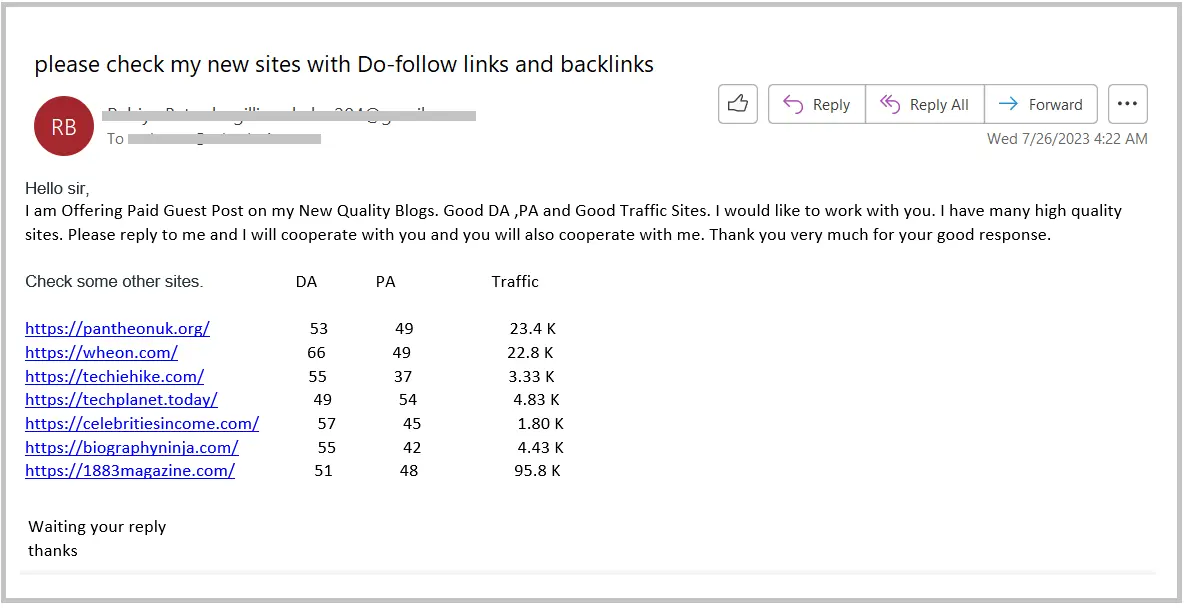
-
Cross-Check with Backlink Blacklists: As a safety net, always counter-check suspicious backlinks against known blacklists. These lists compile domains flagged for dubious practices, giving you an added layer of security.
Remember, vigilance and continuous learning are your allies in the ever-evolving SEO landscape.
Pro tip:
Limit PBN links to a small percentage of your total backlinks, diversifying your backlink portfolio to mitigate SEO risks.

How do you Build a PBN?
Let's be clear right from the outset: While we're about to explain the process of building a PBN, we at Vazoola do not endorse or recommend this approach. We believe in transparent, ethical, and long-lasting SEO practices.
However, to arm you with knowledge (and perhaps to understand what not to do), we're happy to outline how PBNs are typically built.
1. Acquire Domains
The foundation of any PBN is a collection of domains. These domains can either be newly registered or purchased as expired domains.
An expired domain often comes with an existing backlink profile, which can be beneficial for the PBN, provided those backlinks are of good quality.
Many PBN builders hunt for expired domains that have a reputable history and relevant authority in their respective niches.
2. Secure Diverse Hosting
One of the primary giveaways of a PBN is hosting multiple domains on the same server, revealing an easily traceable footprint.
To avoid this, PBN operators seek diverse hosting providers, ensuring that each domain is on a different server and has a unique IP address.
This strategy not only hides the interconnectedness of the network but also mimics the organic diversity of genuine websites.
3. Publish High-Quality Content
While many PBNs resort to spun or low-quality content, a successful PBN will prioritize high-quality, original content.
That way, the site appears genuine and offers value to any visitors, making the PBN less detectable to search engine algorithms.
4. Strengthen with Legitimate Backlinks
A PBN site, like any other website, needs a robust backlink profile to gain authority.
Instead of relying solely on interlinking within the PBN, other website owners will often work to secure legitimate backlinks and authoritative links pointing to their PBN sites. They might do this through guest posts, collaborations, or any other white-hat link-building tactic.
5. Maintain Operational Stealth
Beyond the initial setup, an essential aspect of running a PBN is staying under the radar, which involves mixing in genuine interactions, avoiding over-optimization, regularly updating content, and making the sites as "real" as possible.
Regular maintenance, CMS updates, and user interaction can deflect suspicions and make a PBN site indistinguishable from a genuine one.
Remember, while the allure of rapid gains can make PBNs tempting, the risks involved are substantial.
Investing the same resources in genuine, value-driven SEO strategies is always a wiser, more sustainable choice.
6. Strategically Use Google Search Console
The Google Search Console is a crucial tool for webmasters to understand and improve their site's visibility.
While it provides essential data and insights, its use for Private Blog Networks is a topic of debate, carrying with it both advantages and disadvantages, including:
Pros
-
Better Visibility: GSC offers insights into the data Google has about each of your PBN domains, including backlinks.
-
Sitemap and Diagnostic Access: Users can submit sitemaps and access diagnostic data about the PBN.
-
Enhanced Legitimacy: Verifying a domain in GSC can make a PBN domain appear more like a genuine website, indicating care and maintenance.
-
Instant Notification: Immediate alerts for any deindexation events and a facility to check past manual actions against the domain.
Cons
-
Increased Connection Risks: There's a risk of making mistakes that could link multiple PBNs, such as logging into several accounts from the same IP.
-
Account Management Challenges: The cost and hassle of creating and overseeing numerous Google accounts.
Guidelines for Safe GSC Use with PBNs
In addition to general guidelines for building a private blog network PBN, remember the following tips when creating your private blog network:
-
Distinct Google Accounts: Each PBN domain and money site should have its own separate Google account.
-
VPN Utilization: Always use a VPN when connecting to GSC. NordVPN is recommended due to its extensive server range and consistent IP allocation.
-
Use Gmail PVAs: Purchasing existing Gmail Phone Verified Accounts avoids the phone verification hassle, especially when signing up over a VPN.
-
Email Forwarding Caution: Set up email forwarding judiciously, ensuring not to direct all to the same address and always be wary of embedded images in email clients.
-
Guard Against Browser Fingerprinting: Consider using different browsers, a "User Agent Switcher" plugin, and maintaining consistency in the user agent and VPN server/IP.
Safely adding PBNs to GSC can be tedious. It's a strategy best reserved for the most influential domains or in specific scenarios, like trying to recover a non-indexed high-powered domain from auctions.
As with all SEO tactics, careful planning and adherence are paramount.

How much does it cost to build a PBN?
Setting up a Private Blog Network is not as simple as just buying a bunch of domains. There are a multitude of factors and tasks involved, each carrying its own cost.
Here at Vazoola, while we don't advocate for PBNs, we do recognize the curiosity surrounding their setup and costs. Remember, with PBNs, like most things, you get what you pay for.
When considering the U.S. market:
Domain Acquisition
Domains can range from as low as $10 for a fresh domain to upwards of $300 (or much more) for expired domains with a strong backlink profile.
Hosting
Diverse hosting is a must for PBNs to avoid footprints. This can cost between $3 to $20 per month per site, depending on the hosting provider. If you're operating ten sites, that's already $30 to $200 a month.
Content Creation
Quality content is paramount. Cheap, spun articles can be found for as little as $5, but they do little good. High-quality articles, on the other hand, can cost between $30 to $100 or more each, depending on length, complexity, and the expertise of the writer.
Link Building Strategy
If you're looking to strengthen your PBN sites further with legitimate backlinks, there's an added cost. This can be quite varied, starting from $50 to $500 or even more, based on the source of the links, as well as whether they are high quality backlinks.
Maintenance and Security
Regular updates, CMS management, security protocols, and other maintenance tasks can amount to an additional $20 to $100 per site annually.
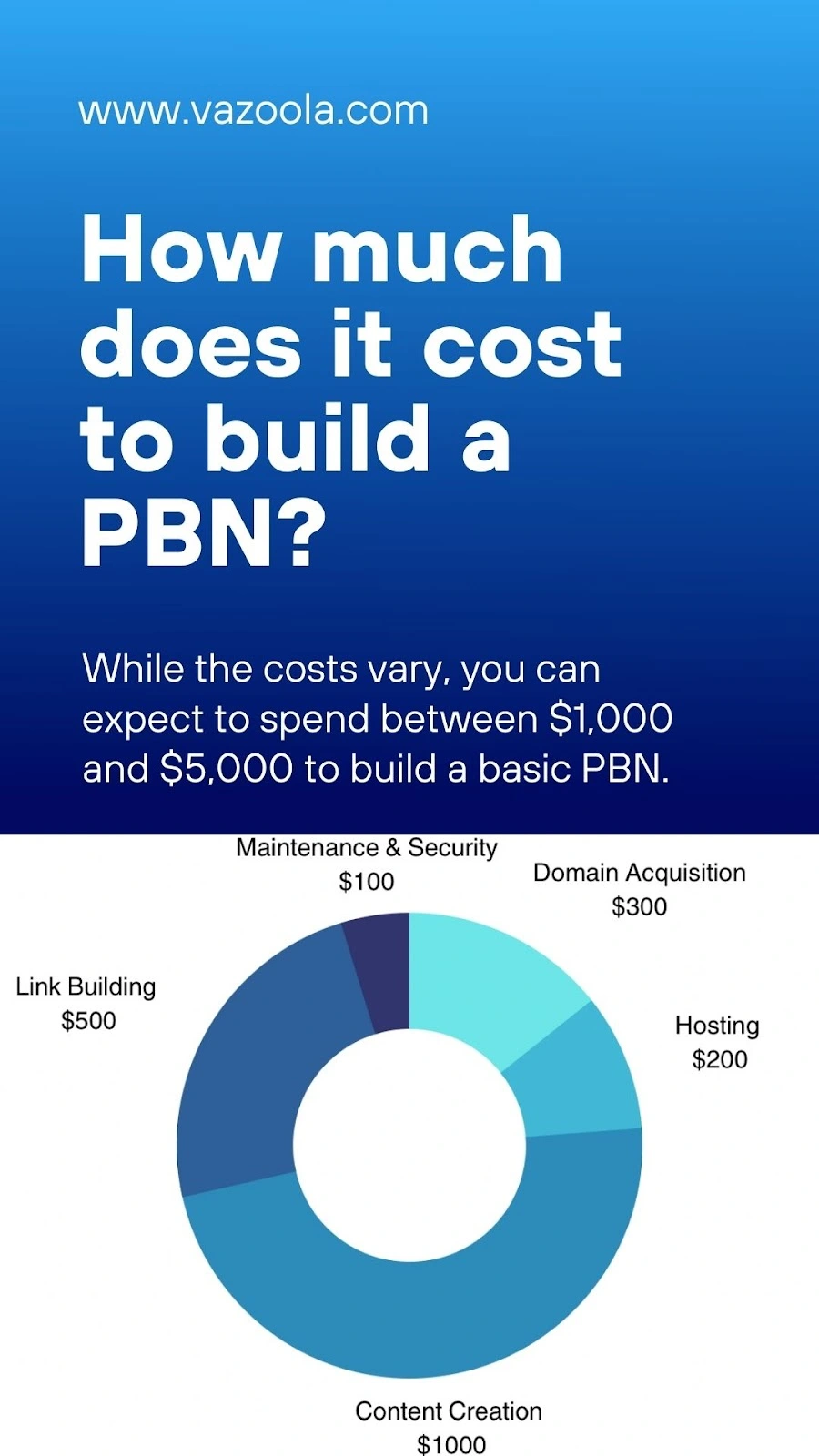
Given the above estimates, if you're looking to set up a basic PBN of 10 sites, you're looking at an initial investment of anywhere from $1,000 to $5,000 (or more).
Subsequent monthly costs for content, hosting, and maintenance can run upwards of $500.
These costs emphasize our stance even further: for the same or even less financial outlay, there are more reliable, sustainable, and ethical SEO strategies to pursue.
Investing in PBNs is not only risky in terms of penalties but also quite the financial gamble.
Safe Strategies we Recommend (Not PBNs)
Navigating the SEO landscape can be tricky. While shortcuts like PBNs might seem tempting, they carry inherent risks that can jeopardize your site's credibility and rankings.
At Vazoola, we've always championed ethical, sustainable strategies that not only boost your online visibility but also fortify your brand's reputation.
Instead of taking the risk associated with PBNs, we recommend the following:
-
Guest Blogging: This strategy involves contributing high-quality content like a blog post to well-established websites in your industry. In return, you often get the opportunity to acquire links back to your site, boosting your domain's authority and visibility.
-
Niche Edits: Instead of creating fresh content, niche edits involve adding your link to existing articles or posts. It's essential, however, to ensure that these edits come across as natural links, and they are relevant to the content.
-
Link Worthy Content: When you produce exceptional, valuable content, other websites will want to link to it. This organic form of SEO not only increases your site's authority but also drives quality traffic.
-
White Hat Link Building Strategy: In the ever-changing world of SEO, there's one constant: Google's Webmaster Guidelines. By adhering to these rules, you ensure that your SEO strategies remain ethical, reducing the risk of penalties.
-
Blogger Outreach: This strategy is all about forging authentic connections with bloggers and influencers in your niche. By offering valuable insights or collaborating on content, you can gain natural high-quality links that boost your site's authority and traffic.
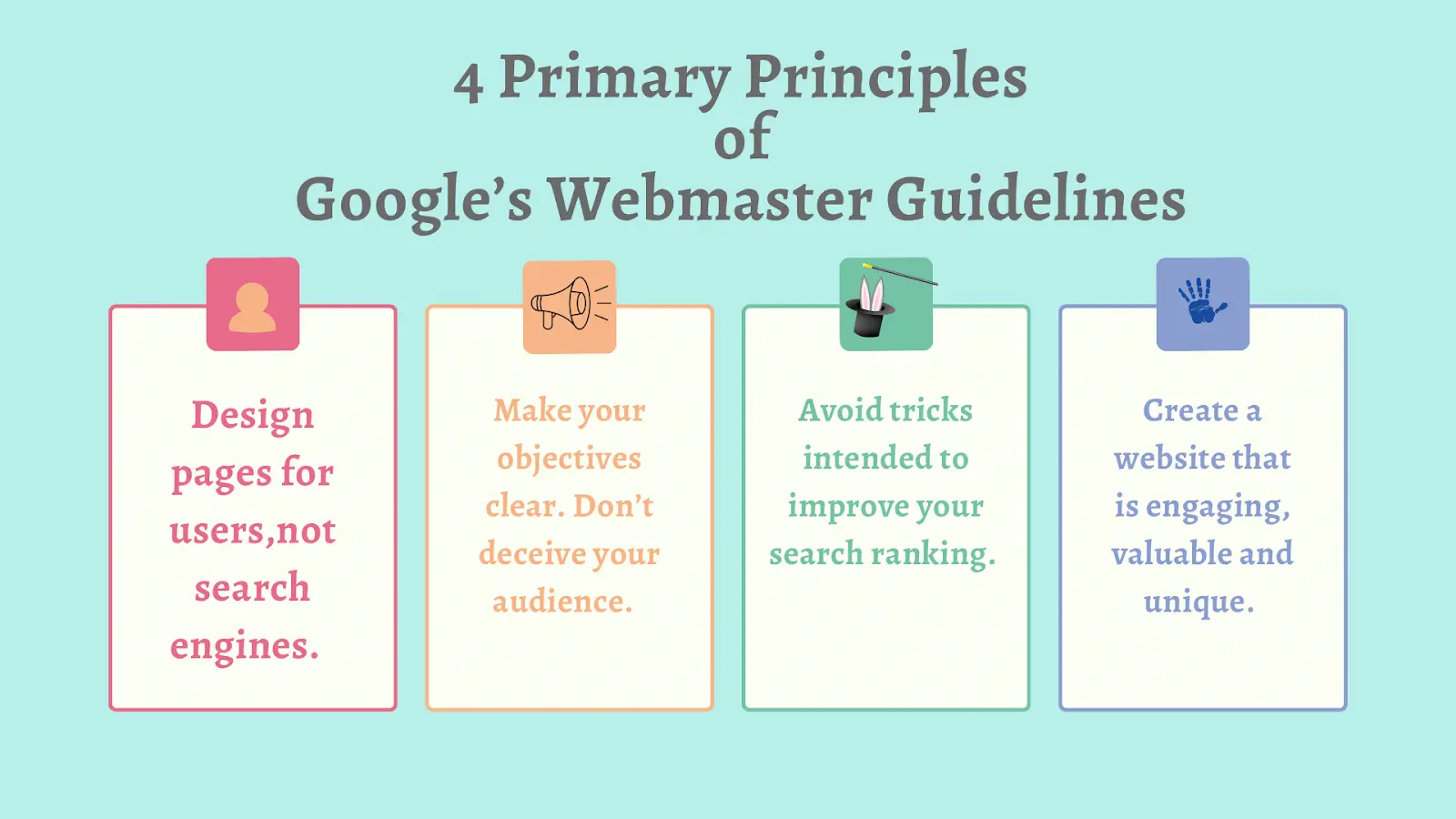
We can't stress enough the importance of building a strong foundation for your SEO efforts. By focusing on these proven tactics, you're investing in the long-term success and credibility of your online presence.
Pro tip:
Instead of solely relying on PBNs, diversify with organic, white-hat link-building techniques to ensure long-term website SEO health.

Debunking Myths About PBNs
The realm of SEO is rife with myths, misconceptions, and half-truths, and PNBs are no exception.
Many myths have arisen surrounding PBNs due to their controversial nature in the SEO community. Let's debunk some of the most common misconceptions about PBNs:
-
All PBNs are spammy and low-quality.
Truth: While many PBNs are indeed low-quality, there are some out there created with meticulous attention to detail, resembling genuine, high-quality sites. However, the intention behind most PBNs—to manipulate search rankings—remains the same.
-
Using PBNs will lead to instant Google penalties.
Truth: Google doesn't automatically penalize every site connected to a PBN. However, if a PBN is detected and seen as an attempt to manipulate rankings, the associated sites can indeed be penalized.
-
PBNs are a long-term SEO strategy.
Truth: PBNs are generally viewed as a short-term strategy. Over time, as search engines refine their algorithms, the risks of using PBNs increase. Sustainable SEO focuses on genuine, organic strategies.
-
Only small or shady businesses use PBNs.
Truth: While many white-hat SEOs and reputable businesses steer clear of PBNs due to the associated risks, there are larger organizations that have dabbled in PBN usage, either directly or through hired SEO agencies.
-
It's impossible to identify a well-built PBN.
Truth: While high-quality PBNs are designed to blend in and mimic real sites, keen observers and advanced tools can still spot telltale signs of a PBN.
-
All backlinks from PBNs are bad.
Truth: From a technical standpoint, a backlink is just a link from one website to another. What makes a PBN backlink potentially harmful is the intent behind it and how search engines interpret that intent.
-
PBNs offer no real value beyond building links.
Truth: While the primary purpose of private blog networks is to manipulate link profiles, well-made PBNs can also provide informative content. However, the ethical and algorithmic risks remain.
By understanding these myths and their associated truths, one can make informed decisions about PBNs and their role in SEO strategies.
At Vazoola, we've always prioritized our client's long-term success. Our experience has shown that while private blog networks might offer a temporary boost, the risks involved make them a strategy best avoided. Stick to white-hat methods for sustainable growth.

